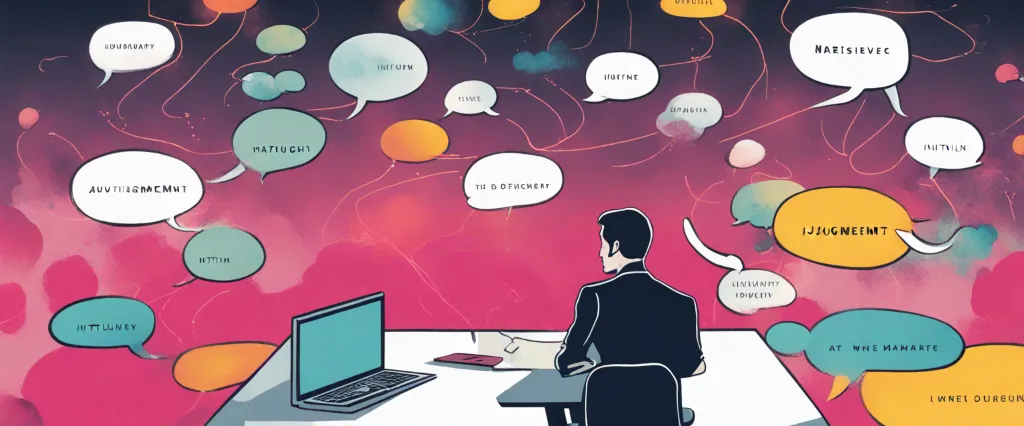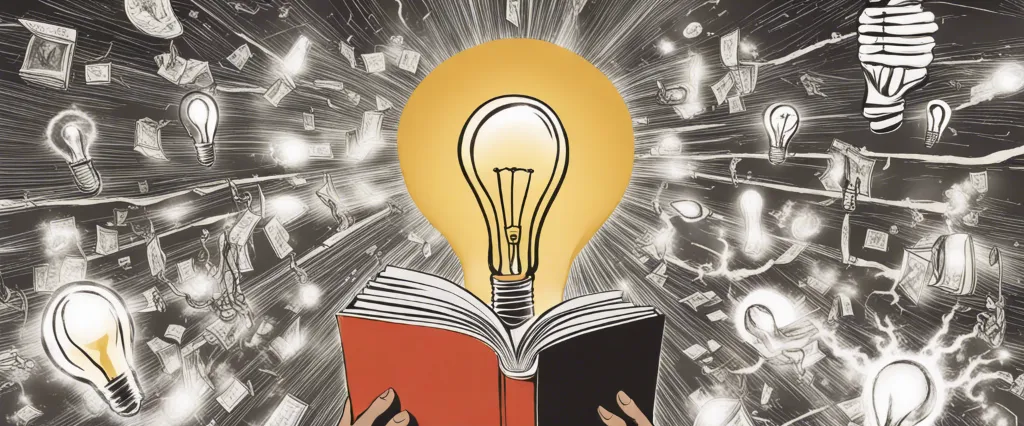——You Are a Badass Every Day by Jen Sincero & How to Fail at Almost Everything and Still Win Big by Scott Adams

In a world filled with self-help literature, two books emerge as beacons of inspiration and motivation, offering unique and contrasting perspectives on achieving personal success. Jen Sincero’s “You Are a Badass Every Day” and Scott Adams’ “How to Fail at Almost Everything and Still Win Big” delve into the depths of human potential, providing readers with invaluable insights and practical strategies to navigate the complex journey of self-improvement.
Sincero, a celebrated success coach and author, takes readers on a transformative journey of self-discovery, urging them to embrace their inner power and tap into their innate badassery. With her signature blend of wit, wisdom, and unabashed enthusiasm, Sincero’s book serves as an empowering guidebook for those seeking to enhance their lives and break through self-imposed limitations. Positivity oozes from her words, encouraging readers to unleash their potential, transcend fear, and create a life they truly love.
Contrasting this unequivocal optimism, Adams, renowned cartoonist and creator of Dilbert, presents a refreshingly pragmatic perspective on achieving success in his book. Shattering traditional notions of failure and triumph, Adams asserts that the path to greatness often involves navigating through numerous missteps, learning from failures, and leveraging diverse skills and systems. With a dose of candid humor and his unique blend of pragmatism and ambition, Adams offers unconventional advice and a fresh, contrarian approach to achieve lasting success in our ever-evolving world.
Though seemingly disparate, Sincero and Adams share a common thread: they challenge conventional thinking, urging readers to question societal norms and discover their authentic selves. While Sincero champions the power of unwavering self-belief, Adams proposes that embracing failure can provide the greatest catalyst for growth and eventual triumph. Through their distinct lenses, both authors implore readers to confront their fears, master new skills, and forge their own unique paths towards success.
As we embark on this comparative study of “You Are a Badass Every Day” and “How to Fail at Almost Everything and Still Win Big,” we will dissect the key themes, strategies, and philosophies proposed by Sincero and Adams. By examining their distinctive approaches to personal growth and success, we will expose the nuances and contrasts that arise, enriching our understanding of the multifaceted nature of the human journey towards self-actualization.
Together, let us explore the empowering realms of self-belief, resilience, and unconventional wisdom presented by these two thought-provoking authors. Through this comparative study, we aim to uncover the diverse paths that can lead us to our fullest potential and equip us with the tools to conquer life’s greatest challenges.
Brief Summary of Two Books
You Are a Badass Every Day by Jen Sincero
“You Are a Badass Every Day” by Jen Sincero is a self-help book that aims to empower readers to take control of their lives and embrace their inner badass. Building on the success of her previous bestseller, “You Are a Badass,” Sincero offers daily strategies and techniques to help readers become more confident, motivated, and successful.
The book is divided into small, digestible chapters that can be read daily, providing a practical guide to incorporate positive habits into one’s routine. Sincero encourages readers to overcome self-doubt and fear, letting go of limiting beliefs and embracing their true potential. She emphasizes the importance of self-love, gratitude, and mindfulness, urging readers to focus on their goals and take consistent action towards achieving them.
Throughout the book, Sincero shares personal anecdotes, inspiring quotes, and practical exercises to help readers build resilience, develop a growth mindset, and cultivate a positive attitude. She challenges readers to identify and confront their fears, break free from societal expectations, and create a life that aligns with their passions and values.
“You Are a Badass Every Day” is a motivational and engaging book that encourages readers to tap into their inner strength. Sincero’s writing style is relatable and humorous, making it an enjoyable and accessible read. By providing daily strategies and encouragement, she helps readers build a strong foundation for personal growth and success, reminding them that they have the power to create a life they love.
How to Fail at Almost Everything and Still Win Big by Scott Adams
“How to Fail at Almost Everything and Still Win Big” is a self-help and memoir book written by Scott Adams, the creator of the popular comic strip Dilbert. The central theme of the book is Adams’ belief that success is not solely dependent on skills or talent, but rather a combination of luck, love, and a willingness to embrace failure.
Adams shares his personal journey, starting from various failed business ventures and disappointments before coming up with the idea for Dilbert. He emphasizes the importance of developing a system rather than setting specific goals, as systems provide a framework for success and can be more effective in the long run.
The book delves into a range of topics, including nutrition, exercise, energy management, and mental wellbeing. Adams encourages readers to focus on personal energy as a critical factor in achieving success, emphasizing the significance of habits, routines, and affirmative self-talk. He also emphasizes the importance of continuous learning and evolving through skill acquisition.
Throughout the book, Adams shares anecdotes, humorous stories, and practical advice that readers can apply to their own lives. He encourages individuals to embrace failure as a necessary step towards success, treating each setback as a lesson rather than a defeat.
In summary, “How to Fail at Almost Everything and Still Win Big” offers a unique perspective on success, advocating for a holistic approach that combines a system-oriented mindset, perseverance, and a willingness to learn from failures. It serves as an inspirational and practical guide for those looking to navigate their way through life’s challenges while aiming for significant achievements.
Comparison between Two Books

Similarities in Positive Thinking
In both “You Are a Badass Every Day” by Jen Sincero and “How to Fail at Almost Everything and Still Win Big” by Scott Adams, there are several notable similarities in their discussions about positive thinking. These books share the belief that positive thinking is a powerful tool for personal growth and achieving success. Let’s explore some key similarities between these two books in relation to the concept of positive thinking:
1. Optimistic Mindset: Both Sincero and Adams emphasize the importance of cultivating an optimistic mindset to overcome challenges and achieve goals. They emphasize that positive thinking helps to shape a favorable mindset, allowing individuals to face obstacles with resilience and determination.
2. Self-Belief and Visualization: Both authors stress the significance of self-belief and visualization in manifesting desired outcomes. They suggest that when individuals consistently visualize their aspirations and believe in their potential to achieve them, they are more likely to attract those outcomes into their reality.
3. Affirmations and Mantras: Sincero and Adams advocate for the use of affirmations and mantras as tools for positive thinking. They encourage readers to develop and repeat empowering statements that reinforce their abilities, foster self-confidence, and promote a positive outlook on life.
4. Gratitude and Appreciation: Both books highlight the importance of gratitude and appreciation in cultivating a positive mindset. Sincero and Adams suggest that expressing gratitude for what one already has allows individuals to shift their focus towards the abundance in their lives, leading to a more positive and fulfilling experience.
5. Overcoming Limiting Beliefs: Sincero and Adams emphasize the need to identify and conquer limiting beliefs that hinder personal growth and positive thinking. They urge readers to challenge these limiting beliefs by reframing them, questioning their validity, and actively replacing them with positive and empowering beliefs.
6. Resilience and Growth: Both authors acknowledge that setbacks and failures are an integral part of the journey towards success. They emphasize the importance of resilience, maintaining a positive attitude, and using failures as opportunities for growth and learning.
While “You Are a Badass Every Day” specifically focuses on daily inspiration and motivation, and “How to Fail at Almost Everything and Still Win Big” offers a broader perspective on finding success, both books converge on the power of positive thinking. They provide valuable insights, strategies, and techniques to develop and maintain an optimistic mindset, ultimately empowering readers to overcome challenges and achieve their goals.
Divergences in Positive Thinking
Both “You Are a Badass Every Day” by Jen Sincero and “How to Fail at Almost Everything and Still Win Big” by Scott Adams delve into the realm of personal growth and self-improvement. While they share similar themes, their approach to positive thinking differs significantly.
In “You Are a Badass Every Day,” Sincero explores the concept of positive thinking as a powerful tool for manifesting one’s desires. She emphasizes the importance of cultivating a positive mindset and offers practical advice on how to overcome self-doubt, embrace gratitude, and adopt affirmations to reprogram one’s thoughts. Sincero encourages readers to actively engage in positivity exercises to develop a resilient and optimistic attitude, which she believes is crucial for achieving success.
On the other hand, Scott Adams takes a somewhat contrasting stance on positive thinking in “How to Fail at Almost Everything and Still Win Big.” Adams argues that blindly relying on positive thinking alone can be misleading and unproductive. Instead, he promotes the concept of the “systems approach” which involves setting up habits and routines that explore different paths to success. Adams encourages readers to focus on continuously improving their skills and building a knowledge base, suggesting that success will naturally follow as a result.
The divergence between these books lies in their interpretation of positive thinking. While Sincero advocates for the power of positive thoughts and affirmations in shaping one’s reality, Adams believes that positive thinking alone may not guarantee success without a systematic approach. Sincero’s narrative centers around the idea that positive thinking attracts positive outcomes, whereas Adams focuses more on a pragmatic approach to success that emphasizes acquiring valuable skills and adapting to changing circumstances.
Ultimately, both authors share the goal of motivating individuals to improve their lives, but their perspectives on positive thinking diverge, with Sincero embracing its power and Adams urging readers to balance it with a practical and systematic approach.

Conclusion
Both books have their own unique qualities and can provide valuable insights, but it ultimately depends on your personal interests and preferences.
“You Are a Badass Every Day” by Jen Sincero is a self-help book that aims to inspire and motivate readers to become the best versions of themselves. It focuses on daily practices and exercises to develop a positive mindset, overcome fears, and embrace personal growth. If you are looking for a book that provides daily inspiration and practical advice for self-improvement, this might be the pick for you.
On the other hand, “How to Fail at Almost Everything and Still Win Big” by Scott Adams, the creator of the Dilbert comic strip, takes a slightly different approach. It combines memoir-like storytelling with practical tips on how to navigate life and achieve success. Adams shares his personal experiences and failures, highlighting the importance of systems over goals, embracing failure as a learning opportunity, and developing multiple skills to increase your odds of success.
If you prefer a mix of personal anecdotes, practical advice, and a humorous approach to self-improvement, “How to Fail at Almost Everything and Still Win Big” might be more suitable for you.
Ultimately, both books offer unique perspectives and valuable lessons. It’s best to consider what you are seeking and choose the book that aligns with your goals and interests.


